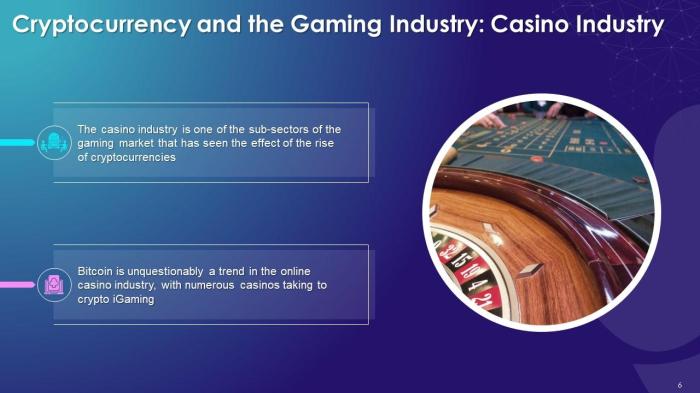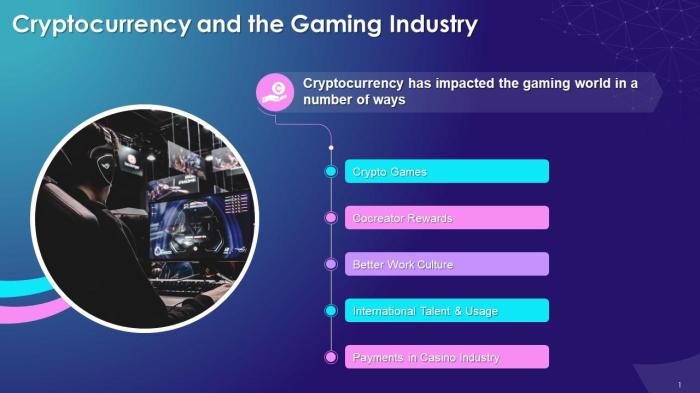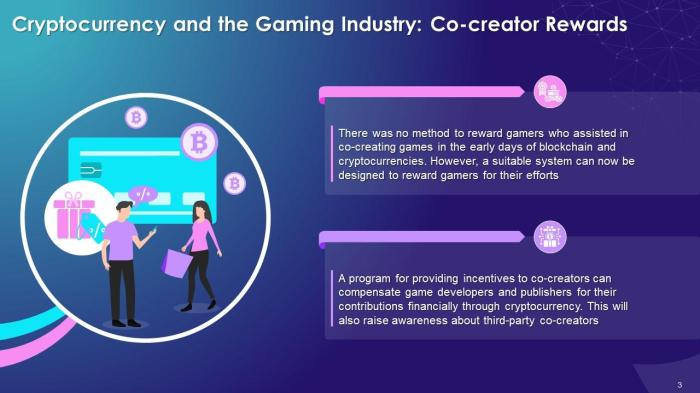Kicking off with How Crypto is Transforming the Gaming Industry, this opening paragraph is designed to captivate and engage the readers, setting the tone American high school hip style that unfolds with each word.
Cryptocurrency and blockchain technology are revolutionizing the gaming sector, bringing new opportunities for gamers and developers alike. Dive into the world where digital assets, NFTs, decentralized platforms, and play-to-earn models are reshaping the gaming industry as we know it.
Overview of Crypto in Gaming

Cryptocurrency has made a significant impact on the gaming industry, offering new opportunities and possibilities for gamers and developers alike. By utilizing blockchain technology, gaming platforms can now provide secure and transparent transactions, as well as unique in-game assets that players can truly own.
Revolutionizing the Gaming Sector
- Blockchain technology ensures that in-game assets are scarce and cannot be duplicated, creating a sense of rarity and value for players.
- Smart contracts enable secure and automated transactions within games, allowing for seamless peer-to-peer trading of digital assets.
- Decentralized platforms offer more control to gamers, reducing the influence of centralized authorities in the gaming ecosystem.
Benefits of Integrating Crypto into Gaming Platforms
- Increased security and transparency in transactions, protecting both players and developers from fraud and scams.
- Lower transaction fees compared to traditional payment methods, providing cost-effective solutions for in-game purchases.
- Enhanced ownership of digital assets, allowing players to buy, sell, and trade game items with full control and autonomy.
Popular Cryptocurrencies in Gaming, How Crypto is Transforming the Gaming Industry
-
Ethereum (ETH): Widely used for creating and trading non-fungible tokens (NFTs) in games, offering unique in-game assets.
-
Enjin Coin (ENJ): Specifically designed for the gaming industry, enabling developers to integrate blockchain technology into their games.
-
Chiliz (CHZ): Used for fan engagement and tokenized rewards in sports and esports platforms, enhancing the gaming experience.
In-Game Assets and NFTs

In the world of gaming, in-game assets and NFTs (Non-Fungible Tokens) have been revolutionizing the way players interact with digital items and the gaming economy.
Definition of In-Game Assets and NFTs
In-game assets refer to items, characters, or virtual goods that players can acquire or use within a video game. On the other hand, NFTs are unique digital tokens that represent ownership of a specific item or asset on the blockchain, ensuring its authenticity and scarcity.
Ownership Transformation with NFTs
NFTs are transforming the ownership of digital assets in games by allowing players to truly own and trade their in-game items outside of the game ecosystem.
- Players can buy, sell, and trade NFTs representing rare in-game assets with other players or collectors, creating a new market for virtual items.
- NFTs provide proof of ownership and authenticity, preventing duplication or counterfeit items in the gaming world.
- This ownership model gives players more control over their digital possessions and the ability to monetize their gaming experience.
Examples of NFTs in Games
Several games have embraced NFTs to offer unique in-game items that players can truly own and trade.
| Game | Use of NFTs |
|---|---|
| CryptoKitties | Players can collect, breed, and trade unique virtual cats using NFTs on the blockchain. |
| Decentraland | Players can buy, sell, and trade virtual land parcels using NFTs, creating a decentralized virtual world. |
| Axie Infinity | Players can own and trade digital pets (Axies) as NFTs, enabling them to earn in-game rewards and cryptocurrency. |
Impact of NFTs on the Gaming Economy
NFTs have a profound impact on the gaming economy by introducing new revenue streams and enhancing player engagement.
- NFTs create a secondary market for in-game assets, allowing players to monetize their gaming achievements and investments.
- Developers can generate additional income by selling limited edition NFTs or partnering with artists and creators to design unique digital items.
- The scarcity and authenticity of NFTs add value to virtual assets, attracting collectors and investors to the gaming industry.
Decentralized Gaming Platforms: How Crypto Is Transforming The Gaming Industry
Decentralized gaming platforms, powered by blockchain technology, are revolutionizing the gaming industry by offering increased security, ownership, and autonomy to players and developers alike.
Security and Ownership Comparison
Decentralized gaming platforms provide enhanced security and ownership compared to traditional platforms. With blockchain technology, player data and in-game assets are securely stored and cannot be altered or manipulated by centralized authorities. This ensures a level playing field for all participants and protects against fraud or hacking.
- Players have full ownership of their in-game assets, such as skins, weapons, or characters, as these assets are stored on the blockchain in the form of non-fungible tokens (NFTs).
- Developers benefit from transparent and tamper-proof game mechanics, ensuring fair gameplay and preventing cheating or exploitation.
Advantages of Decentralization
Decentralized gaming platforms offer several advantages for both gamers and developers. Players can enjoy true ownership of their in-game assets and have the ability to trade or sell them in a secure and transparent manner. Developers can create innovative game mechanics without the constraints of centralized control, leading to more diverse and engaging gaming experiences.
- Decentralization fosters a sense of community among players, as they have a stake in the game’s ecosystem and can actively participate in its development.
- Smart contracts enable automated and trustless transactions, reducing the need for intermediaries and lowering transaction costs for both players and developers.
Reshaping the Gaming Industry
Decentralized gaming platforms are reshaping the gaming industry by democratizing access to gaming and empowering players and developers with greater control and ownership. As more games adopt blockchain technology, we can expect to see a shift towards a more inclusive and transparent gaming landscape where creativity and innovation thrive.
Play-to-Earn Models

The play-to-earn model in crypto gaming allows players to earn cryptocurrency by engaging in gameplay, completing tasks, or achieving in-game milestones. This innovative approach has the potential to revolutionize the gaming industry by providing gamers with real-world economic opportunities while enjoying their favorite games.
Examples of Play-to-Earn Games
- Axie Infinity: Players can collect, breed, and battle fantasy creatures called Axies to earn the native cryptocurrency AXS and SLP tokens.
- Lost Relics: This action-adventure RPG game rewards players with the cryptocurrency Enjin Coin (ENJ) for completing quests, looting treasures, and defeating enemies.
- Mythereum: A collectible card game where players can earn Ethereum (ETH) by participating in battles and tournaments.
Empowerment through Play-to-Earn
Play-to-earn models have the potential to empower gamers economically by providing them with a new source of income. Players from regions with limited job opportunities or financial resources can benefit greatly from earning cryptocurrency through gaming, improving their financial situation and quality of life.
Challenges and Opportunities
-
Challenge:
Regulatory Uncertainty – The legality and taxation of earning cryptocurrency through games may vary across different jurisdictions, posing challenges for players.
-
Opportunity:
Financial Inclusion – Play-to-earn models can open up financial opportunities for individuals who may not have access to traditional banking systems, promoting financial inclusion.
-
Challenge:
Game Balance Concerns – Balancing gameplay and economic incentives to prevent exploitation and maintain a fair gaming environment is a challenge for developers implementing play-to-earn models.